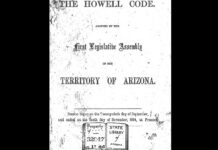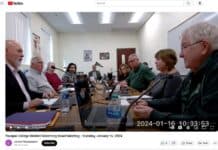Just over a month from now, students in Arizona are scheduled to return to class.
Late last month, Arizona Gov. Doug Ducey signed an executive order extending the reopening date to Monday, Aug. 17, pushing it back from about two weeks from now.
Assuming the notoriously fickle governor doesn’t remodulate the opening date yet again as with so many other things during this global pandemic, we strongly urge local school districts to follow the guidelines put out by the Arizona Department of Health Services and Centers for Disease Control and Prevention and open for in-classroom instruction on the date the governor announces.
Students have been out of school since late March, more than five months. Given the extended summer, our students have not been in a classroom with a teacher nearly half a year. Our students are suffering greatly academically, intellectually and even physically. Being stuck at home with nothing but a television and a computer is monumentally detrimental to their development. Growing children need intellectual stimulation, interaction with other people other than parents and siblings and regularity in order to successfully develop into functional adults.
Teachers already dread summer break because of the education loss that takes place over those two months. Ergo, teachers must spend the first few weeks recapping the previous year and getting students back up to speed. After five months outside the classroom, the educational delay will be catastrophic. If school is delayed until October as some suggest, teachers will be re-educating so much of last year’s instruction that Arizona students will effectively be repeating the previous grade level.
The American Association of Pediatrics strongly urge schools and school districts to return to their home as soon as possible with whatever safety protocols are required.
While Arizona faces varying levels of infections across the state, mostly in heavily populated urban areas like Phoenix metro and Tucson, Yavapai County has one of the lowest infection rates in the state. If the rest of Arizona had followed Yavapai County’s lead on social distancing and avoiding crowds, the infection rates would likely be far lower. But hindsight is 20/20 and Arizona finds itself in a collective uptick, although the vast majority of these numbers are in Maricopa and Pima counties, and Pinal County between them.
Strictly speaking, conditions are not all doom and gloom for our youngest residents. Children are the least likely to get infected and are less likely to show symptoms compared to adults, according to the Mayo Clinic.
Parents should be keeping children home if they are sick, pandemic or not, and if that is coupled with social distancing on campus and periodic temperature checks and free testing, schools can be safe for students.
If children can’t go to school because their school mandates they stay home for online instruction, then if the child is age 12 and younger, parents have to stay home, too. Not all parents have the option to work from home. Some parents are furloughed or have been fired, but the $600 federal unemployment bonus is set to expire Friday, July 31, and all indications are that Congress won’t settle on an agreement for an extension, meaning parents will need to find work to pay rent and the bills. They need the flexibility to send their children to school so they can work.
Children come home to families with parents, or a parent, mainly in their 20s, 30s and 40s, who are at lower risk than seniors. If parents choose to keep their students home for health and safety reasons, that is entirely their right. If children have grandparents at home and the risk of bringing the virus home to a grandparent is too high, parents can keep children home.
Teachers who may be fearful of the virus may have the option to be an online teacher if offered, or take extra precautions they deem necessary, or request some other assignment within the district. But teachers should view the education of their students as a paramount concern and trust county and state health officials and their district if all three deem local in-classroom education safe.
Right now, education funding is calculated by a head count of students actively in classrooms 100 days after the start of school. If schools have a mix of students on campus and others learning at home via video conferencing, this head count becomes complicated.
If the state provides an in-classroom start date and school districts opt out for months in defiance of health experts, then they should begin refunding taxpayers for the services they do not provide our children.
However, parents who want to send their children to school because they know children are low risk, or need schools to care for them while they work, or want them to get an on-campus education because they feel online schooling has been ineffective, or because they don’t have a computer and/or decent internet connection at home, then they should be allowed to send their children to school if state officials have said schools are safe. Parents shouldn’t be forced to keep children at home if it runs counter to state guidelines and pediatric experts.
Christopher Fox Graham
Managing Editor






















